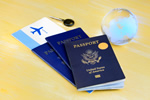Visas for expatriates considering long-stay residence in Thailand

Visas for expatriates considering long-stay residence in Thailand
Recently, much has been seen on social media about the many revisions to long-established routines for getting and retaining the correct visa to live, work or retire in Thailand. Unfortunately, the following examples aren’t set in tablets of stone, as the present immigration authority has made and is assumed to still be making changes to existing permit rules for even long-stay expats who’ve been in the country for some years.
The non-immigrant O-A visa is mostly used to get lawful, comparatively long-term status in Thailand and is extendable depending on each individual’s specific circumstances. For expats arriving to work, the business visa is essential, as to work without it is illegal and risks fines and deportation. The visa itself can be used as a platform for an official work permit and is also used by executives attending corporate functions in the country. Two types exist as of now, with the first for SMEs and lasting one year and the second only applying to large companies on a two-year basis.
The ‘O’ visa applies to expats married to Thai nationals, and can only be had by application to an overseas Thai embassy or consulate. Valid initially for one year, extensions of stay will require 400,000 baht in a Thai bank account for a year or the receipt from an outside source of 40,000 baht per month. The visa can be used as a springboard for a work permit or for exclusively supporting Thai children.
As regards retirement, Thailand has no specific retirement visa, but either O or O-A visas must show 800,000 baht in a Thai bank account or prove the receipt of at least 65,000 baht per month from an outside source for at least a year before application is made. Recently, for USA and UK applicants using the above visas for retirement purposes, the certification of monthly account receipts provided by foreign consulates and embassies in Thailand was cancelled due to the unproven possibility that some expatriates might be exaggerating and unable to guarantee their stated income.
Another recent change is that expats on O-A visas must now be covered by private health insurance provided by selected Thai companies even if individuals are already covered by Western-sourced private health insurance. The cover provided is inadequate, expensive and unobtainable to those over 75 years of age. Other visa options for expat determined to live, work or stay long-term in Thailand are at present limited to two visas – the so-called Elite Visa, valid for five years at a cost of 500,000 baht or ten years at a million baht. Both of these are seen as basic tourist visas with VIP status tacked on.
Education visas are intended to allow those studying in Thai language schools a one-year stay and possible extensions, but the permit was being used by those wishing to stay without financial entitlement and are now rarely granted and subject to immigration hassles. Recent calls for digital nomad visas have, so far, been rejected.
Related Stories:
- Saudi extends visas and permits of expat professionals trapped overseas - July 14, 2020
- Thailand unwilling to extend amnesty for trapped expats - July 10, 2020
- Expats trapped in Thailand fear the end of their visa amnesty - July 8, 2020
- Expats in Thailand rethinking relocation due to the high baht - July 6, 2020
- Pros and cons of Thailand as an expat destination - July 1, 2020
- Expatriates in Hong Kong fearing Beijing’s new national security law - June 28, 2020
- Should potential Brit expatriates still head for Spain? - June 17, 2020
- How are expats in Thailand coping with the uncertainty? - June 15, 2020
- Expats in Thailand denied the security of permanent residency - June 11, 2020
Latest News:
- Tips on a trouble-free relocation as an expat overseas - July 20, 2020
- Expats find peace in the covid-19 refuge of Dahab town - July 20, 2020
- Is Kuwaitization the unintended result of the oil price crash? - July 20, 2020
- Expats unhappy abut changes to Korean points-based visa system - July 17, 2020
- Chiang Mai and Bangkok no longer bargain locations for expats - July 17, 2020
- Expats in Malaysia still banned from overseas travel - July 17, 2020
- Vietnam welcomes expats to its safe, affordable lifestyle - July 16, 2020
- Asian tiger economies reach out to expats in Hong Kong - July 16, 2020
- HSBC Asia to cut back on internal expat relocations - July 16, 2020
- Tips on integrating for newly-arrived expats - July 15, 2020


